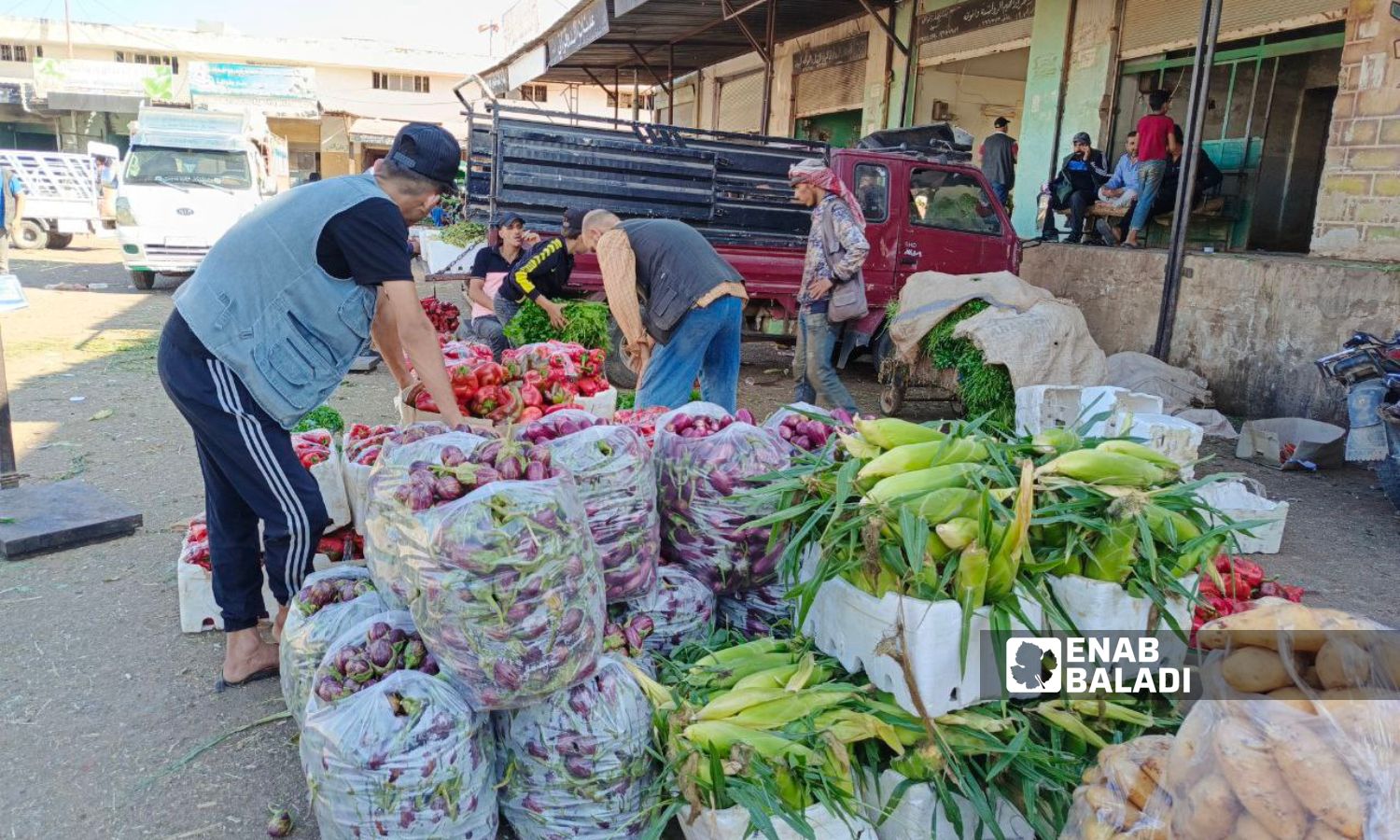



Daraa – Halim Muhammad
The season for preparing makdous has begun promisingly for families in Daraa, southern Syria, with the drop in eggplant prices, which did not please farmers who were expecting prices to yield them a profit margin.
Last August, the price of one kilogram of eggplants in the al-Hal market in the Daraa countryside reached 1,000 Syrian pounds, an unusually low price, despite the overall rise in the prices of most goods and materials.
The price of one kilogram of eggplant was 4,000 Syrian pounds (27 cents) during the peak season last year.
Farmers interviewed by Enab Baladi attributed this year’s low eggplant prices to the abundance of supply and the lack of demand from makdous making facilities compared to 2023.
Farmer Mahmoud owns ten dunams of eggplants in the town of Jileen in the western countryside of Daraa and considers that the price of eggplants does not cover the harvesting costs. Harvesting one kilogram costs approximately 2,000 Syrian pounds (13 cents).
The costs consist of workers’ wages, with each worker earning 6,000 Syrian pounds (40 cents) per hour, and the cost of the bag containing the eggplants is 500 Syrian pounds.
The major cost lies in transporting the crop to the al-Hal market. The fee for transporting it from the Daraa countryside to Damascus is 1.5 million Syrian pounds (100 US dollars), while the fee for transporting it from the western Daraa countryside to the al-Hal market in Tafas is 300,000 Syrian pounds (20 dollars).
The farmer mentioned that eggplants need to be harvested every two days, and neglecting to harvest affects the crop quality.
The farmer hoped for eggplant prices to improve with the onset of makdous production by Daraa’s residents in mid-August, but his hopes were dashed as prices remained low.
If prices do not improve this September, the farmer is considering selling the crop as fodder for livestock.
Yasser (47 years old), a farmer from the town of Muzayrib in the western countryside of Daraa, has five dunams of eggplants and said that the demand from makdous making facilities is weak compared to last year when he sold his entire crop to them. This year, he is supplying his produce to the market.
He added that the loss does not stop at the inability to cover harvesting costs but extends to agricultural expenses, estimating his loss at about 15 million Syrian pounds (1,000 US dollars) if the low eggplant prices continue.
Director of Daraa’s agriculture, Bassam al-Hashish, estimated the province’s eggplant production this season at 35,000 tons, according to a statement to the government newspaper, Al-Thawra.
Since mid-August, women in Daraa have started producing makdous, a staple item they make sure to store, as no house in Daraa is without it.
Sanaa (40 years old), a resident of the city of Tafas, quickly started making makdous early to take advantage of the low eggplant price.
She said that the prices of other ingredients are high, but the price of one kilogram of eggplants at 1,000 pounds encouraged her to start, as she bought a kilogram last year for 4,000 pounds.
Sanaa completed her supplies with 100 kilograms of eggplants. She stated she bought one kilogram of walnuts at 120,000 Syrian pounds (eight dollars), compared to 100,000 pounds last year.
Sanaa economized on the amount of walnuts used as the production of 100 kilograms of eggplant requires at least three kilograms of walnuts.
The price of peppers remained steady at 5,000 Syrian pounds in the al-Hal market. Sanaa needed 50 kilograms of hot and sweet peppers to produce her amount of makdous.
The price of one kilogram of garlic used in makdous production reached 75,000 Syrian pounds (five dollars), compared to 35,000 pounds last season. She needed one kilogram of garlic to prepare the makdous supplies.
Sunflower oil maintained its price at 25,000 Syrian pounds per liter.
For the second consecutive year, Sanaa replaced sunflower oil with olive oil, priced at 60,000 Syrian pounds per liter.
Sanaa estimated the cost of making makdous this year at 600,000 Syrian pounds, relying on a remittance sent by her expatriate brother in Europe.
if you think the article contain wrong information or you have additional details Send Correction